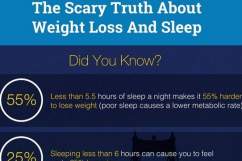If you struggle with insomnia as many Americans do, then someone has probably recommended that you take a melatonin supplement before. But if you want to know about it before you start popping pills (even if they are just natural supplements), then read on and watch the video above for some facts.
What is Melatonin?
Melatonin is a naturally occurring hormone in your body. It is produced to regulate your sleep and wake cycles, or your circadian rhythm.
Melatonin and Sleep:
The hormone is mainly produced in your brain. After it’s produced, it is released into your blood stream, and causes you to feel drowsy and lowers your body temperature.
Melatonin is also produced in smaller amounts in your retina, skin, and eye lenses. Each evening, dimmer lights are supposed to make us feel sleepy. That’s why melatonin is sometimes called ‘hormone of the darkness.’
Melatonin is a catalyst for sleep. That’s why if you suffer from insomnia, then you should try not to watch TV, scroll through your phone, or do work on your laptop in bed. It’ll make it harder for you to fall asleep. Also, you should NOT turn on your lights when you wake up at night, as it will slow melatonin production and it will be harder for you to go back to sleep.
Melatonin Supplements
This is one of the most popular natural sleep aids for insomnia and jet lag, and these are two of the most recommended brands.
2. Source Naturals NightRest with Melatonin
Melatonin Side Effects
According to WebMD, melatonin does have some side effects.
Sleepiness.
Lower body temperature.
Vivid dreams.
Morning grogginess.
Small changes in blood pressure.





